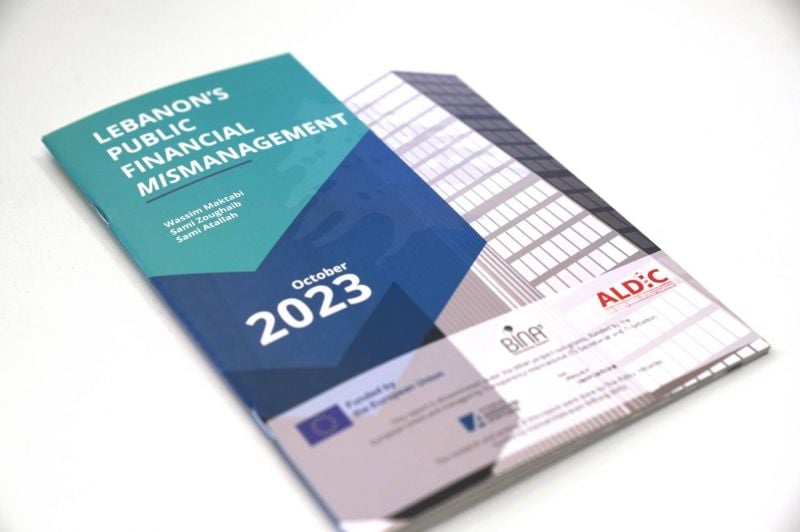
Hard copy of Lebanon's PFM report. Credit: Mohammed Yassine
BEIRUT — The Lebanese Association for Taxpayers’ Rights (ALDIC) held a conference on Tuesday to discuss the findings of its latest report on Lebanon’s Public Financial Mismanagement (PFM), done in collaboration with Lebanese think tank The Policy Initiative and Konrad Adenauer Stiftung, a German political foundation.
ALDIC, a union launched to address the tax literacy gap in the country, undertook the report in 2023 at a time when the ruling class made no substantial reforms to pull Lebanon out of its worst economic crisis to date.
The report utilized the following six international PFM best practices to assess Lebanon’s fiscal and budgetary standing: budget credibility, transparency and comprehensiveness of public finances, policy-based budgeting, budget execution, accounting and reporting, and external scrutiny and audit.
Karim Daher, head of the Tax and Fiscal Policies Committee at ALDIC, said Lebanon failed to meet all the aforementioned criteria.
“If no reforms aren’t done to Lebanon's public finance management first, there’s no point in having any other reforms,” stressed Daher.
Understanding public finance requires a comprehension of its two branches: government revenues and government expenditures, which should be carefully planned and determined in the country’s budget every year, Daher added.
One of the prerequisites of the staff-level agreement reached with the International Monetary Fund (IMF) in 2022 to unlock its $3 billion aid package to Lebanon is for the Lebanese government to“implement fiscal reforms [...] ensure debt sustainability and create space to invest in social spending, reconstruction and infrastructure.”
Economist and deputy prime minister Saade Chami told L’Orient Today in April that Lebanon was still far from unlocking an IMF deal, two years after a staff-level agreement (SLA) was reached with the international organization.
Weak public finance management practices
“Lebanon’s 2024 budget [ratified in January], while better than previous ones, is far from offering a realistic approach to managing the country’s public finance. It offers no economic strategy or vision for neither the short nor the long run” said Daher.
Speaking at the conference, PFM expert Iskander Boustany said “the difference between projected and actual spending reached around 60 percent over the past years.” This indicated extremely poor financial planning and means “some funds that were originally destined for a specific use, were allocated somewhere else.”
The report also found that Lebanon’s budget execution was weak, mainly due to the high levels of economic informality and a lack of enforcement, which yielded substantial losses due to tax evasion. The difference between projected and actual revenues ranged between -9 percent to +26 percent.
“Estimated losses in potential tax revenues have averaged around $2.2 billion during the crisis, 3.5 times higher than the average pre-crisis losses [$761 million],” said Boustany.
Lebanon also scored 9/100 on the Open Budget Index — a measure used to assess a country’s budget transparency — placing it as one of the least transparent countries in the world.
With the current outdated structure, any budget that passes will fail to yield a substantial outcome, Boustany warned.